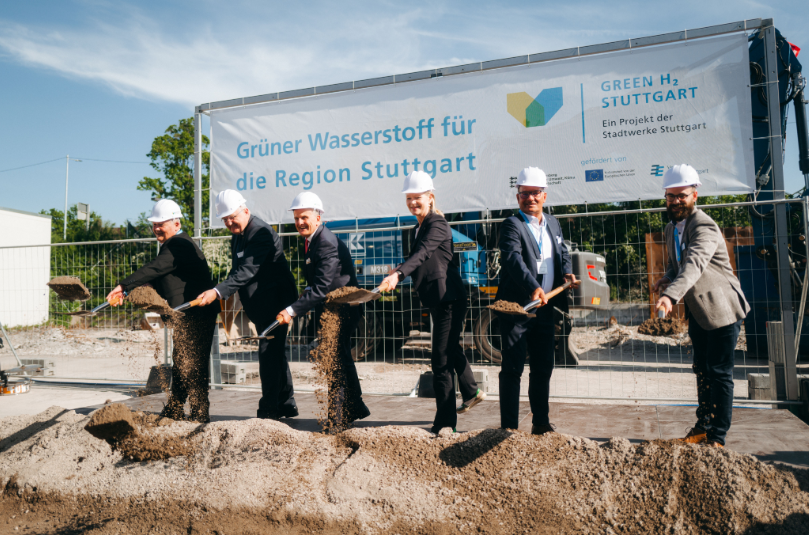The City of Stuttgart has officially begun construction of its first large-scale green hydrogen production facility at the Stuttgart Port. With a ceremonial groundbreaking on Monday, Stadtwerke Stuttgart (SWS) marked the launch of the Green Hydrogen Hub Stuttgart (GH2S) — a pivotal initiative to deliver carbon-free energy solutions and advance Stuttgart’s climate goals.
“This project is another cornerstone in building an efficient, CO₂-free energy supply for the Stuttgart region,” said Peter Drausnigg, Technical Managing Director at Stadtwerke Stuttgart.
The event at the GH2S site at Mittelkai 25 welcomed around 150 invited guests, including Thekla Walker, Minister for the Environment of Baden-Württemberg, Rainer Wieland, Chairman of the Stuttgart Region Association, and Dr. Frank Nopper, Mayor of Stuttgart. All three emphasized the project’s importance not only for the city but also for the broader region and its industrial future.
A Three-Part Clean Hydrogen Strategy
The overall initiative includes:
-
Production and logistics at the Green Hydrogen Hub (GH2S)
-
Distribution via the H2 GeNeSiS pipeline
-
Application through the HyPulseST project
The total project investment for this initial phase is approximately €50 million, with around €16.6 million coming from public funding. The Stuttgart Region Association is contributing €10 million toward GH2S and HyPulseST. The EU and the state of Baden-Württemberg are jointly supporting the pipeline construction with €6.6 million.
Completion and commissioning are expected by December 2026.
Hydrogen Production from Renewable Energy
SWS will now begin constructing the electrolyzer and supporting logistics at Stuttgart Port. The facility will convert surplus wind and solar energy into high-purity green hydrogen. This clean fuel will support industrial operations and power fuel cell buses, trucks, and ships.
“Stadtwerke Stuttgart is transforming our port into a hub of technological change. With GH2S, Stuttgart becomes a model for green hydrogen. The future annual production of 1,200 tonnes of hydrogen will equate to 4 million liters of diesel and save around 15,000 tonnes of CO₂ each year,” said Mayor Dr. Frank Nopper.
Starting in late 2026, three electrolyzers will generate up to 1,000 tonnes of green hydrogen annually, with delivery via trailers or a new underground pipeline stretching from Stuttgart-East to Esslingen. Hydrogen refueling stations and other industrial users will be connected along the route.
“A Strong Signal for the Hydrogen Economy”
“Hydrogen is key to the energy transition,” said Thekla Walker, Baden-Württemberg’s Environment Minister. “It stands for climate protection and secure energy supply. As an industrial leader, Baden-Württemberg must be at the forefront. This project makes a strong statement: we are shaping the transformation.”
“Our regional hydrogen strategy supports the transformation of the economy and enhances Stuttgart’s appeal as a business hub,” added Rainer Wieland of the Stuttgart Region Association. “Projects like GH2S are essential for making hydrogen a real, viable energy alternative in society.”
With this groundbreaking, Stuttgart strengthens its role as a front-runner in Germany’s hydrogen economy, delivering real-world implementation of climate policy, industrial competitiveness, and clean energy leadership.


